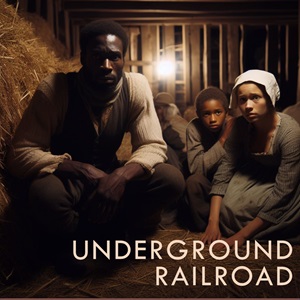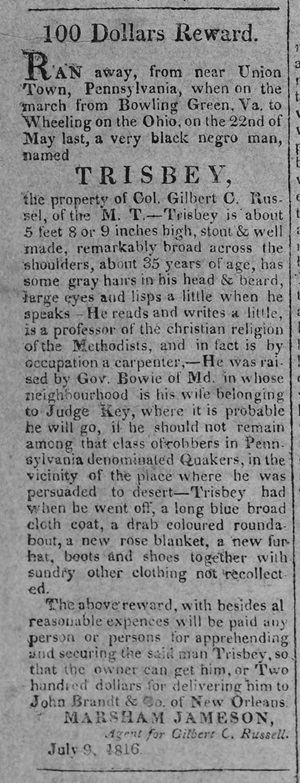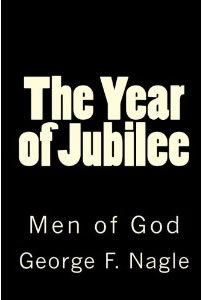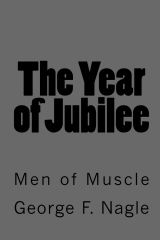 Slavery
Slaveryto
freedom


Study Areas
Underground Railroad
Trisbey Escapes from Colonel Russell While Traveling Through Uniontown
From an 1816 Fugitive Slave Advertisement
Aid for escaped slaves in Fayette County, Pennsylvania began early, partly through the anti-slavery sentiments and efforts of large numbers of Quakers in the region. Uniontown became known as an Underground Railroad hub, partly because of its location on major roads leading west, but also through the work of local anti-slavery activists. As a result of its reputation, it also attracted the regular attention of slave hunters, which led to several clashes between those aiding fugitive slaves and those in pursuit of them.
In the advertisement below, the enslaved man Trisbey escaped from Col. Gilbert C. Russell while traveling through the town. The advertisement makes clear that Russell believed Trisbey was aided by local Quakers in his escape.

100 Dollars Reward.
RAN away, from near Union Town, Pennsylvania, when on the march from Bowling Green, Va. to Wheeling on the Ohio, on the 22nd of May last, a very black negro man, named
TRISBEY,
the property of Col. Gilbert C. Russel, of the M.T. -- Trisbey is about 5 feet 8 or 9 inches high, stout & well made, remarkably broad across the shoulders, about 35 years of age, has some gray hairs in his head & beard, large eyes and lisps a little when he speaks. He reads and writes a little, is a professor of the christian religion of the Methodists, and in fact is by occupation a carpenter, -- He was raised by Gov. Bowie of Md. in whose neighbourhood is he wife belonging to Judge Key, where it is probable he will go, if he should not remain among that class of robbers in Pennsylvania denominated Quakers, in the vicinity of the place where he was persuaded to desert -- Trisbey had when he went off, a long blue broad cloth coat, a drab couloured roundabout, a new rose blanket, a new fur hat, boots and shoes together with sundry other clothing not recollected.
The above reward, with besides al[l] reasonable expences will be paid any person or persons for apprehending and securing the said man Trisbey, so that the owner can get him, or Two hundred dollars for delivering him to John Brandt & Co. of New Orleans.
MARSHAM JAMESON,
Agent for Gilbert C. Russell.
July 9, 1816.
Notes
Colonel Gilbert C. Russell (1782-1861) commanded the 3rd United States Infantry through 1815, achieving the rank of colonel. He was discharged in 1815 and became a merchant and businessman, making his home in Alabama. Trisbey was previously enslaved by Maryland Governor Robert Bowie, who enslaved large numbers of people, with more than eighty enslaved persons in his estate inventory at his death. Trisbey's wife was enslaved by another Maryland man, identified as Judge Key. Russell believed Trisbay would attempt to make his way back to his wife. This is possibly Judge John Ross Key (1754-1821), father of Francis Sott Key. The other Judge Key in the area, Philip Barton Key, brother to John Ross Key, had died about one year prior to the advertisement above was published.
Sources
- The Franklin Repository Weekly (Chambersburg, PA), 16 July 1816.
Now Available on this site
The Year of Jubilee
Vol. 1: Men of God and Vol. 2: Men of Muscle
by George F. Nagle
Both volumes of the Afrolumens book are now available on this website. Click the cover images to read.
The Year of Jubilee is the story of Harrisburg'g free African American community, from the era of colonialism and slavery to hard-won freedom.
 Volume
One, Men of God, covers the turbulent beginnings of this community,
from Hercules and the first slaves, the growth of slavery in central
Pennsylvania, the Harrisburg area slave plantations, early runaway
slaves, to the birth of a free black community. Men of God is a detailed
history of Harrisburg's first black entrepreneurs, the early black
churches, the first black neighborhoods, and the maturing of the social
institutions that supported this vibrant community.
Volume
One, Men of God, covers the turbulent beginnings of this community,
from Hercules and the first slaves, the growth of slavery in central
Pennsylvania, the Harrisburg area slave plantations, early runaway
slaves, to the birth of a free black community. Men of God is a detailed
history of Harrisburg's first black entrepreneurs, the early black
churches, the first black neighborhoods, and the maturing of the social
institutions that supported this vibrant community.
It includes an extensive examination of state and federal laws governing slave ownership and the recovery of runaway slaves, the growth of the colonization movement, anti-colonization efforts, anti-slavery, abolitionism and radical abolitionism. It concludes with the complex relationship between Harrisburg's black and white abolitionists, and details the efforts and activities of each group as they worked separately at first, then learned to cooperate in fighting against slavery. Read it here.
Non-fiction, history. 607 pages, softcover.
 Volume
Two, Men of Muscle takes the story from 1850 and the Fugitive Slave
Law of 1850, through the explosive 1850s to the coming of Civil War
to central Pennsylvania. In this volume, Harrisburg's African American
community weathers kidnappings, raids, riots, plots, murders, intimidation,
and the coming of war. Caught between hostile Union soldiers and deadly
Confederate soldiers, they ultimately had to choose between fleeing
or fighting. This is the story of that choice.
Volume
Two, Men of Muscle takes the story from 1850 and the Fugitive Slave
Law of 1850, through the explosive 1850s to the coming of Civil War
to central Pennsylvania. In this volume, Harrisburg's African American
community weathers kidnappings, raids, riots, plots, murders, intimidation,
and the coming of war. Caught between hostile Union soldiers and deadly
Confederate soldiers, they ultimately had to choose between fleeing
or fighting. This is the story of that choice.
Non-fiction, history. 630 pages, softcover.